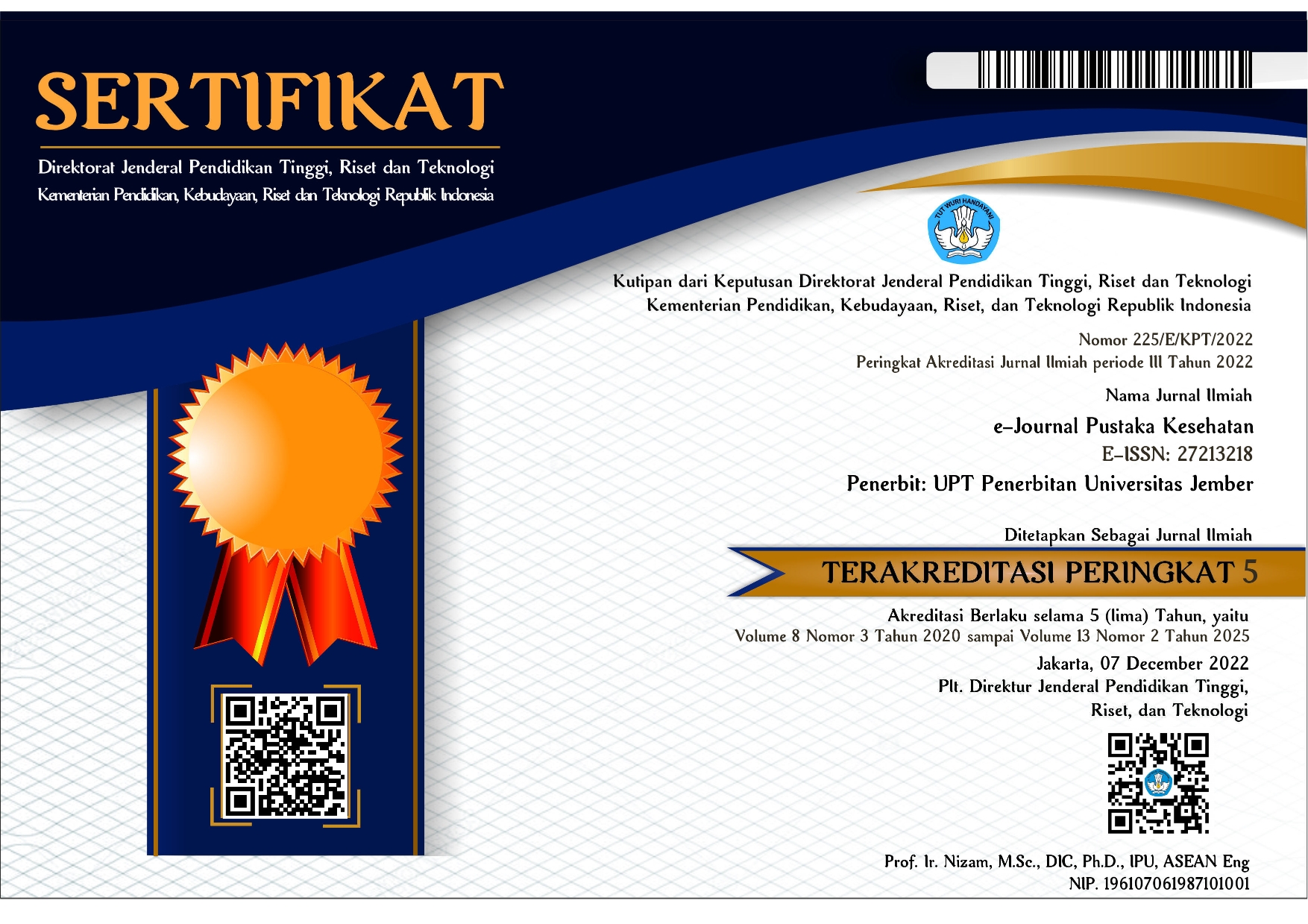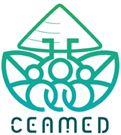Gambaran Input Program Pelayanan Obstetri dan Neonatal Emergensi Dasar (PONED) di Puskesmas Silo I Jember
Abstract
Complications in pregnancy and childbirth can not be predicted. One of the efforts to improve obstetric complications prevention services is strengthening PONED. A Primary Health Care that experienced of an increase in Maternal Mortality Rate (MMR) and Infant Mortality Rate (IMR) cases is Silo I Primary Health Care. The study aimed to describe the input of the Basic Emergency Obstetric and Neonatal Service (BEONEC) program at the Silo I Primary Health Care in Jember. The result showed that the availability of human resources has not been in accordance with established guidelines. The PONED team has not been in service for 24 hours. The financing does not have special PONED fund allocation. The availability of medicines for obstetrical and neonatal consumables in the category is sufficiently available. The available room is limited. Medical and non-medical equipment are complete enough to carry out emergency services. Supporting facilities are available in full at the health center. Silo I Health Center has a Standard Operating Procedure (SOP) with a complete category.
References
2. Azwar, A. 2010. Pengantar Administrasi Kesehatan Edisi Ketiga. Jakarta : Binarupa Aksara
3. Dinas Kesehatan Kabupaten Jember. 2017. Pemantauan Wilayah Setempat Kesehatan Ibu dan Anak (PWSKIA) 2016. Jember: Dinas Kesehatan Jember
4. Dinas Kesehatan Provinsi Jawa Timur. 2015. Profil Kesehatan Provinsi Jawa Timur 2014. Surabaya : Dinas Kesehatan Provinsi Jawa Timur.
5. Jaya ST, Johanes CM, Hadi S, Farid H, Jusuf S, Deni K. 2019. Hubungan Sumber Daya Manusia, Sarana Prasarana, Komunikasi PONED-PONEK, dan Standar Operasional Prosedur dengan Syarat dan Persiapan Rujukan Puskesmas PONED. Jurnal kesehatan Prima, Vol 13, no 1, hal 41-50
6. Kementerian Kesehatan RI. 2013. Pedoman Puskesmas Mampu Pelayanan Obstetri dan Neonatal (PONED) Tahun 2013. Jakarta : Kementrian Kesehatan RI.
7. Kismoyo, C.P. 2012. Benarkah Puskesmas Efektif ? Jurnal Kebijakan Kesehatan Indonesia. Vol 01, no 2 hal 93-102
8. Mujiati, Yuniar Y. 2016. Ketersediaan Sumber Daya Manusia Kesehatan pada Fasilitas Kesehatan Tingkat Pertama dalam era Jaminan Kesehatan Nasional di Delapan Kabupaten-Kota di Indonesia. Media Litbangkes. Vol. 26 No. 4 Hal. 201-210
9. Rejeki ST, Akhyar M, Hari S. 2016. Implentation of Basic Obstetric and Neonatal Emergency Service Program (PONED) at Health Centers, Tegal. Journal of Maternal and Child Health, 1(4) : 257-267
10. Rusdiana HA. dan Ghazin A. 2014. Asas-asas Manajemen Berwasasan Global. Bandung : Pustaka Setia
11. Sane Bebby May. 2018. Analisis Pelaksanaan Program Pelayanan Obstetri dan Neonatal Emergensi Dasar (PONED) di Puskesmas Negeri Lama Kabupaten Labuhan Batu Tahun 2017. Skripsi. Medan: Fakultas Kesehatan Masyarakat Universitas Sumatra Utara
12. Siregar ML. 2016. Analisis Implementasi Pelayanan Poned di Puskesmas Patumbak Kabupaten Deli Serdang Tahun 2016. Skripsi. Medan : Fakultas Kesehatan Masyarakat Universitas Sumatra Utara
13. Wijaya K. 2012. Evaluasi Persiapan Puskesmas Pelayanan Obstetri Neonatal Emergensi Dasar (PONED) di Kabupaten Brebes Tahun 2012. Jurnal Kesehatan Masyarakat. Vol 1, no 2 hal 72-81

This work is licensed under a Creative Commons Attribution-ShareAlike 4.0 International License.
e-Journal Pustaka Kesehatan has CC-BY-SA or an equivalent license as the optimal license for the publication, distribution, use, and reuse of scholarly work. Authors who publish with this journal retain copyright and grant the journal right of first publication with the work simultaneously licensed under a Creative Commons Attribution-ShareAlike 4.0 International License that allows others to share the work with an acknowledgment of the work's authorship and initial publication in this journal.











